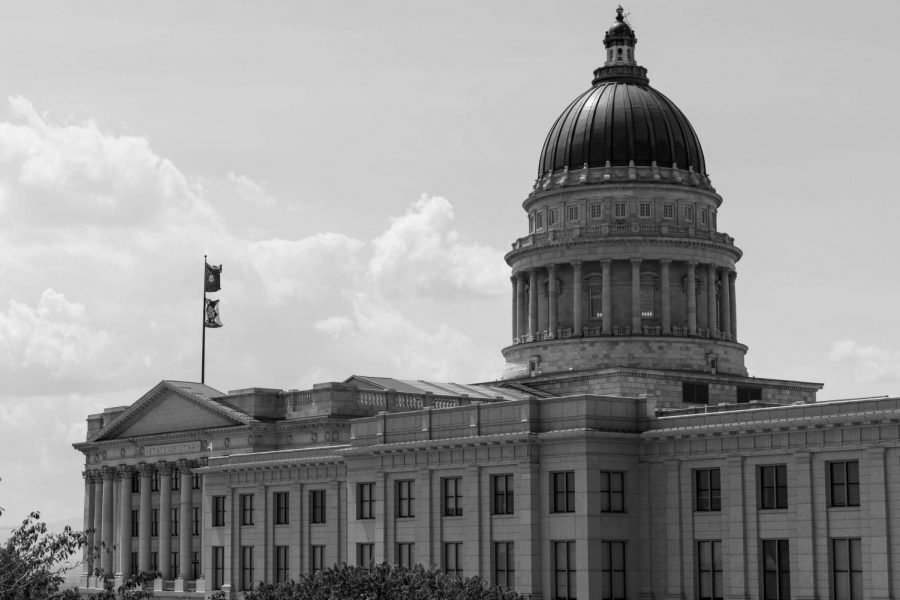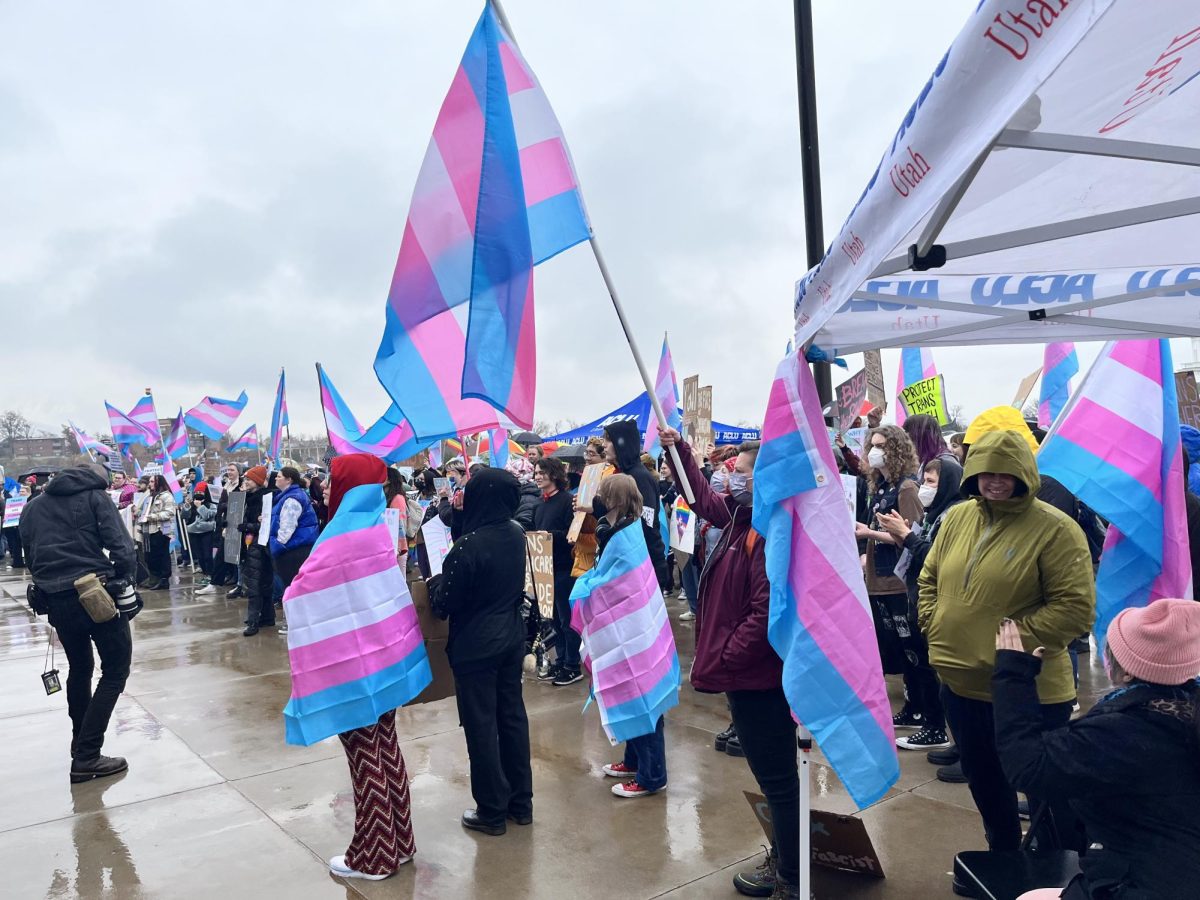Let’s Recap: The 2023 Utah State Legislative Session
A view of the Utah State Capitol Building in Salt Lake City on Aug. 21, 2021. (Photo by Kevin Cody | The Daily Utah Chronicle)
March 5, 2023
After 45 days of committee hearings, floor time and robust discussion, the 2023 Utah State Legislative Session closed out on Friday. With 926 bills being filed and 575 being passed by the state’s governing body, lawmakers were busy drafting and creating legislation affecting the lives of all Utahns. It’s difficult to keep track of what goes on inside the Capitol, but here is a look at important bills that passed and didn’t pass through the legislature.
Transgender Healthcare
In the first weeks of the legislative session, four bills regarding healthcare for transgender youth were presented and discussed in various committee and floor hearings.
Sen. Michael Kennedy’s S.B. 16, signed into law by Utah Gov. Spencer Cox on Jan. 28, bans gender-affirming care for minors. This new law prohibits minors from accessing gender-affirming surgery and puberty and hormone blockers.
Sen. Todd Weiler’s S.B. 100, signed into law on Feb. 16, ensures a parent’s ability to access information from a school about their child, including if they express a change in gender identity.
S.B. 93 from Sen. Daniel McCay prohibits transgender youth under 16 the ability to change their designated sex on their birth certificate and requires parental consent for a minor looking to change their birth certificate as well as proof they understand the implications of changing it.
H.B. 132 from Rep. Rex Shipp was intended to be a stricter ban on sex-transitioning procedures for minors but did not make it out of its first House committee hearing.
The three bills that passed were not met without opposition. Rallies took place on the steps of the Capitol and in front of the governor’s office to protest these bills.
Sen. Jen Plumb was a vocal advocate against these bills throughout the session and spoke to her own experiences as a parent of a transgender child. “I am sorry that we live in a world where you have to write to your elected representatives to beg for basic human rights,” she said during a protest on Jan. 24.
School Vouchers and Teacher Salaries
Rep. Candice B. Pierucci’s H.B. 215, signed into law on Jan. 28, creates a school voucher program and bumps Utah teachers’ pay and benefits by $6,000.
The bill allocates $42 million from taxpayer funds to give scholarships to about 5,000 schoolchildren so they have an opportunity to attend private school.
When parents apply for the “Utah Fits All Scholarship,” priority will be given to lower-income households.
The bill was met with opposition and support. Opposers were concerned with how it included vouchers and teacher pay in one bill, arguing that the issues were separate and should be discussed further. Supporters believed the bill put power back into the hands of parents.
“Water Week” and the Great Salt Lake Crisis
One issue that was on people’s minds was water consumption and the drying of the Great Salt Lake. The Utah legislature held a “Water Week” in February to talk about water rights and the drying lake.
Plumb’s S.B. 92 passed and creates a special Great Salt Lake Preservation license plate. The funds will go to the Sovereign Lands Management Account, which helps preserve the lake and its ecosystem.
Sen. Nate Blouin introduced a resolution to set a minimum target elevation of 4,198 feet for the Great Salt Lake, but the resolution failed to pass out of a Senate committee. Sen. Scott Sandall voted against the resolution because, as he said during committee, “taking the position that we’re going to set a number on a terminal lake … tends to elevate it above a holistic approach to everything else in our economy.”
Sandall’s S.B. 76 addresses how municipal and county commissions must work with the Division of Water Resources in creating development plans and gives funds to the Department of Natural Resources, Department of Environmental Quality and Department of Agriculture and Food.
Rep. Calvin R. Musselman’s H.B. 307, Utah Water Ways, establishes a new statewide nonprofit partnership to address water conservation. The program will sponsor policy discussions about water use, coordinate conversations between different departments and create campaigns addressing water use on the individual and corporate levels.
Drug Measures
Utah legalized the medical use of cannabis in 2018 and this session, Rep. Jennifer Dailey-Provost created H.B. 230, which will establish a Medical Cannabis Research Center in Utah. It will be housed in the University of Utah but is not an entity of the university.
Dailey-Provost said her goal with this program was to establish one entity to monitor all the research being done on medical cannabis. She said another goal is to create a National Institute of Health growth site in the state where medical cannabis can be studied. She said there are statutory guidelines, but she wants the program to take off on its own.
“I think it’s specific enough that they’ve got direction but vague enough that they can create a program that meets the needs of the industry and the patients,” she told the Chronicle.
Dailey-Provost also introduced H.B. 227, which adds regulations to the production of hemp. The Utah Department of Agriculture and Food will now require the registration of non-cannabinoid products like hemp fiber, hemp seed oil and hemp paper. It also creates a hemp producer registration process and prohibits the sale of a product containing THC or THC analog to someone under 21.
Dailey-Provost said these amendments are necessary to address the dramatic and rapid changes in the science of these products. “We have to be very, very clear where we draw the line between what is medical cannabis and what is industrial hemp,” she said.
H.B. 227 was met with frustration from distributors, producers and people who use hemp products instead of medical cannabis during a House committee meeting.
Sen. Luz Escamilla introduced S.B. 200, which failed to pass out of committee, but would have decriminalized the possession of psilocybin and allowed people over 21 to receive a psilocybin treatment from a psilocybin therapy provider, granted they had medical justification such as anxiety, depression or PTSD.
Psilocybin, also referred to as “magic mushrooms,” is a psychedelic fungus that when ingested, can have hallucinogenic effects on the brain.
Escamilla knew it would be an uphill battle, but she said Utah shouldn’t have to wait for the FDA’s approval.
Utah’s neighbor, Colorado, is the second state to decriminalize magic mushrooms. Proposition 122 will allow people over 21 to grow and share psychedelic mushrooms and create state-regulated healing centers where people can take psilocybin under the direct supervision of medical professionals.
Restricting Abortion Access
Last year, Roe v. Wade was overturned in the U.S. Supreme Court, which allowed for Utah’s abortion trigger ban to go into effect. This trigger law is currently on hold due to pending litigation.
Rep. Karianne Lisonbee presented H.B. 467, which will effectively close all abortion clinics in Utah, prevent victims of rape or incest from receiving an abortion after 18 weeks of gestation and give criminal licensing penalties for doctors who perform abortions against these new statutes.
Rep. Kera Birkeland’s H.B. 297 addresses how victims of sexual assault are required to report to law enforcement before receiving an abortion.
These bills were met with opposition from Planned Parenthood of Utah, the American Civil Liberties Union of Utah and concerned citizens.
Gov. Cox is expected to sign both bills into law.
Diversity, Equity and Inclusion in Higher Education
Two bills were introduced regarding Diversity, Equity and Inclusion programs in higher education. H.B. 451 from Rep. Katy Hall, which failed to pass through the legislature, would have prohibited state entities from using certain statements regarding diversity, equity and inclusion to determine employment, admissions or other benefits.
Sen. John Johnson introduced S.B. 283, which originally was supposed to prohibit the funding of diversity, equity and inclusion programs in higher education, but was changed to a study of the programs for the interim. Despite the change, the bill failed to pass.
Johnson said his constituents were concerned these programs were prioritizing and promoting political or social ideologies, rather than focusing on education. He said during committee that “robust discussion” was necessary to find solutions and agreed to move the bill to the Education Committee for a study during the interim this summer.
“We’re spending over $11 million a year on these programs across the state right now,” Johnson said. “And the real question is, where? Where are the benefits?”
During the committee hearing, U President Taylor Randall spoke to the bill. He said he works with EDI professionals every day and the work they do is remarkable. Randall added that by collaborating and studying diversity, equity and inclusion, they will find many benefits in the programs.
“We’re going to gain a deeper understanding of the significant health and education and housing and economic disparities in the state,” Randall said. “These disparities are real.”












